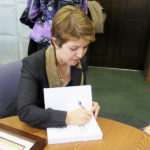By Anne Marie Amacher
The Catholic Messenger
DAVENPORT — Last month, two young refugees from the Democratic Republic of the Congo, Africa, shared with junior high students at John F. Kennedy Catholic School.
Accompanying the refugees was Amy Rowell, director of World Relief based in Moline, Ill., which helps refugees and other immigrants settle in the United States.

Amy Rowell, center, introduces refugees Esther Zawadi and Fabris Vasukuku during a talk at John F. Kennedy Catholic School in Davenport on March 15.
Esther Zawadi, 20, was originally from the Congo, but her family fled to Zambia when she was very young. She spent 16 years in a refugee camp. “My family came to America for a better life and a better education for us. It was not easy. We knew British English, but not American English.”
She arrived in the U.S. at age 17 and started high school in Moline, Ill. She said it was an adjustment, so she stuck with one of her sisters. Now she is studying to earn a General Education Diploma (GED) and would like to be a nurse in the future. “Life is good here. I am beginning my future.”
Fabris Vasukuku, 17, said it was not safe living in the Congo. He lived in a refugee camp before arriving in the United States at age 12. “I was not scared to come here. I was proud to come here.” He is currently a student at Rock Island High School in Illinois. He is not sure what he wants to do after graduation, but he likes to do hands-on activities. He is leaning toward being an electrician.
Both refugees said that even though they knew English, the language was the hardest thing to adapt to after their arrival. Both speak at least four languages.
JFK students submitted questions ahead of time to ask the refugees. In response to a question about their favorite sports, Esther said she likes soccer — watching it, not playing it. Fabris loves to play soccer.
He said his favorite food is chicken nuggets. In the Congo, it was beans and rice, which has different seasonings than what is served in the U.S. Esther and Fabris said education is very important to them and their families. Similar subjects are taken in Africa, but with less access to technology, they said.
About a dozen refugee students in the Quad Cities created a group called global leaders, Rowell said. They focus on leadership and continuing their education and getting employed. She told the students that World Relief works with area governments and churches to help refugees rebuild their lives in the United States. That partnership helps refugees and their families to enroll in school, have a home ready for them, along with food and safety.
She noted that the largest number of refugees World Relief locally has settled come from Myanmar/Burma, followed by the Congo and Iraq. “Refugees have no choice to stay in their country or return,” Rowell said. “They will be killed.”
Pat Archer, a sociology professor at St. Ambrose University in Davenport, also spoke with students. He noted that, of the 325 million people living in the United States, about 45 million were born outside the country.
He provided a history lesson about immigration to the United States from Europe, especially in the late 1800s to early 1900s. From 1924-1965, immigration to the U.S. was basically stopped. Today, the process for immigrants to enter the U.S. is very complicated, he said.
He identified four ways to enter the United States legally:
• Reunification of families in which an immediate family member can be sponsored. “There are limits and it is not easy.”
• Employment basis. People with certain skills are needed to work in the U.S. This process can be temporary or permanent.
• Refugee status. This applies to people who cannot return to their homeland because of religious persecution or other violence. The president and Congress determine how many people can come to the U.S.
• Visa program, a complicated process done to “diversify the population.”
Of the 11 million people in the U.S. without legal status, about 7 million arrived here legally on a visa, but it expired, Archer said.
Kent Ferris, director of social action for the Diocese of Davenport, spoke of church teaching on welcoming the stranger. He quoted from the Old Testament and New Testament about welcoming the stranger. He pointed out that U.S. bishops are encouraging members of Congress to welcome more immigrants and refugees to the United States rather than reduce the numbers. “Many people who come to the United States have no choice but to flee from the violence. They want the best life for their children as well,” Ferris said.
Ana Schott, a counselor at JFK who organized the event, said it was courageous for the two young people to share their stories and for students to get a glimpse of their lives. She asked the students to reflect on what they heard and what they can do differently in their lives because of what they heard.










